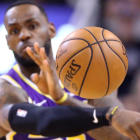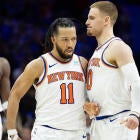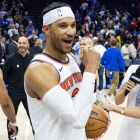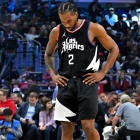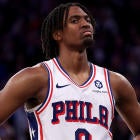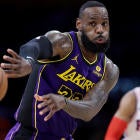Imagine preparing to play the Los Angeles Lakers. LeBron James is always the smartest player in the arena, and he has the ball in his hands on just about every possession when he's on the court, with a bunch of shooters, rolling bigs and another superstar playing off of him.
The Lakers boast the NBA's fourth-ranked defense to go with their fourth-ranked offense. They present problems other teams don't because of their size and physicality. There is a lot to think about.
One of the Lakers' strengths, though, is that they afford opponents little time to think. When James sees an opportunity to get an easy bucket in transition, the ball is usually out of his hands before the defense has any idea what is going on.
The Lakers scored their first two field goals against the Blazers last Friday this way:
And there was another one a couple of minutes later:
Before a recent game against Los Angeles, Brooklyn Nets coach Kenny Atkinson said the Lakers would test their transition defense even more than Giannis Antetokounmpo's Milwaukee Bucks did. "The PPP [points per possession] when [LeBron] brings the ball up, I looked at the numbers, I almost fell off my chair," Atkinson said. I don't know what internal metrics the Nets have, but, according to Synergy Sports, the Lakers have scored 1.607 points per possession on James' transition plays, including his assists.
Only three teams spend more time in transition than Los Angeles, per Cleaning the Glass, and none score more points on those possessions. (Adjusting for pace, the Lakers also lead the league in old-fashioned fast-break points, per NBA.com.) Some of this is because James is still a terrifying sight when rumbling down the court at full speed, but a lot of it is a result of a team-wide effort to leak out.
"You run a lot more when you have a willing passer," Lakers forward Jared Dudley said. "Lonzo Ball, Jason Kidd back in the day, people just know. LeBron wants to get people involved."
Dudley also compared James to his former Suns teammate Steve Nash, who shared James' penchant for hit-ahead passes. Lakers guard Avery Bradley said that he will sometimes "just contest and keep going, knowing that LeBron can potentially get the rebound and just throw it down." Anthony Davis is rather fond of doing this, too:
Every time I see James fire off one of those passes, I think about how draining it must be for the defense. Los Angeles is essentially getting free points, and a team that talented shouldn't need them. Its opponents all know that they need to sprint back, so it is extra frustrating when they slip up and are immediately punished for it.
"Anything that's an emphasis on the scouting report that's not executed is demoralizing," Bradley said, likening it to going into a game focused on limiting offensive rebounds and then failing to box out properly. "It honestly can get you out of your game plan a little bit."
The Lakers experience the opposite effect. Look at the bench as Bradley lays the ball in here:
Suggesting that basketball players like to run and score is not exactly profound. It is not a coincidence, though, that this season's Lakers have Showtimes vibes on the court and are getting along so well off it. Full-court alley-oops are fun:
Lakers coach Frank Vogel said that these types of plays give them "necessary energy." They can play through James and Davis in the halfcourt, he said, but they're at their best when they get stops and attack before the defense is set.
There is truth to the cliche that the game slows down in the playoffs, which is why Los Angeles could trade for a playmaker before Thursday's deadline (or simply sign Darren Collison). Regardless of what time of year it is, though, Vogel wants the Lakers to push the ball on "as many possessions as possible." His players will happily oblige.
Zion: not normal
You've seen Zion Williamson's highlights: He leaps around and over defenders for dunks, and when he creates contact, bodies bounce off of him. He is a wrecking ball when he catches the ball on the move. His second jump is already legendary, and he ripped the ball right out of Giannis' hands on Tuesday. But even the simple things he does make you yell at the TV.
On Sunday, Williamson often found himself matched up with Houston Rockets forward P.J. Tucker. If you have ever seen Tucker up close, you know that he is an athletic marvel, with the frame of a football player and the lateral quickness to defend guards. Tucker is listed at 6-foot-5 in socks, but his strength has allowed him to play significant minutes at 5 for the last three seasons. He is so good at it that the Rockets just traded Clint Capela, an actual center who is young and productive.
Opposing big men have learned that posting Tucker up is not a winning proposition. Which is why this play floored me:
Williamson dwarfs Tucker there. And when he spins, look at how much ground he covers. Williamson's left foot pivots from the free throw line into a layup, and Tucker goes from having the situation under control to watching the ball fall through the net. Williamson is so wide that it is difficult to even contest the shot.
It is going to take a while to get used to seeing someone this large and powerful move the way Williamson does. The whole thing is sort of Shaq-like, but Williamson is faster and more explosive. Here he is successfully attacking Tucker again:
Goodness.
Kuzmania
People love to argue about Kyle Kuzma, the Lakers' 24-year-old forward who has 4.5 million Instagram followers, dyed blond hair and a divisive game. Kuzma was undeniably a steal at No. 27 in the 2017 draft, but reasonable people can disagree about what the Lakers should do with him.
I asked Dudley, the wise veteran, what Kuzma brings to the team, and he almost immediately brought up the Mamba Mentality. (This was before Kobe Bryant's death.)
"His best attribute is a killer mindset, in a sense of trying to attack, attack," Dudley said. "À la Kobe, he's always thinking score, thinking attack. Sometimes he might have some bad shots, but it's a good mindset to have, where, on a team that is very, very unselfish, you need a guy that says, 'Hey, let me go get a bucket, let me attack this guy.'"
This is Bill Simmons' argument for having an "irrational confidence guy." Kuzma is averaging 13.1 points on 53.9 percent true shooting, and he's a career 33.7 percent 3-point shooter, but you never know when he's going to catch fire. On Christmas Day, he had 25 points in 27 minutes off the bench against the Los Angeles Clippers. The Lakers might need that scoring punch if that matchup materializes in the postseason.
"It's good to have him," Dudley said. "Yeah, we can work on his overall game, but to have that mentality and mindset is crucial for this team."
Does Kuzma's ability to get buckets outweigh everything else? Kuzma tries on defense, but he is mistake-prone. He has upside, a rare quality on this roster, but the Lakers owe it to James to maximize their chances of winning a title this season. That might mean moving him -- on a rookie contract that is paying him a little less than $2 million this season -- in exchange for a ballhandler like Derrick Rose.
The best case for keeping Kuzma is that Los Angeles will need to play Davis heavy minutes at center when the games really matter. As my colleague Sam Quinn noted in his deep dive on this conundrum, lineups featuring James, Kuzma and Davis in the frontcourt have been awesome at both ends. This is a compelling argument, but it assumes that Kuzma will be as reliable as the Lakers need him to be under playoff pressure. That assumption is not without risk.
The fresh starters
Here's a five-man unit of players who could use a new home before the deadline.
G: Dennis Smith Jr., Knicks: He's only 22, and while this season has been a nightmare, he occasionally reminds you of why he was such a highly regarded prospect, even recently. I'd love to see another team give him a shot.
G: Denzel Valentine, Bulls: Valentine is not even an average defender, but I liked the way he was playing offensively before his minutes got erratic again. It feels like his confidence has been affected by his situation, and I wouldn't be surprised if he turned into a more consistent backup elsewhere.
F: Aaron Gordon, Magic: It just feels overdue. I desperately want to see Gordon on a team with a more functional offense. We haven't seen the best of him yet. (He's still 24!)
F: Kevin Love, Cavaliers: Hmmm, not sure how Love's name wound up here. He's in such a perfect situation already. Weird.
C: Harry Giles, Kings: I remain confused about Sacramento declining to pick up his fourth-year option. From the moment it drafted the center in 2017, the front office knew he would be a long-term project. If the Kings aren't invested in his development, it should trade him to a team that is.
Ring the bell
Before the reported four-team, 12-player (!) trade late Tuesday, Jordan Bell might have been on the above list. I love that he landed with the Rockets, given what they need from their role players. Don't be surprised if they rejuvenate Bell the same way they have Ben McLemore.
Bell and McLemore couldn't be more different, but the idea is the same: In Houston, if your name isn't James Harden or Russell Westbrook, you will have narrowly defined responsibilities. Bell is an athletic big who can set screens and catch lobs, and I bet he'll be a better defender now that he's told to switch everything. Now that the Rockets are playing faster, you can expect him to get some dunks in transition, too.
I was a little surprised that Houston didn't also nab Noah Vonleh from the Timberwolves. Hope the Nuggets find minutes for him.













